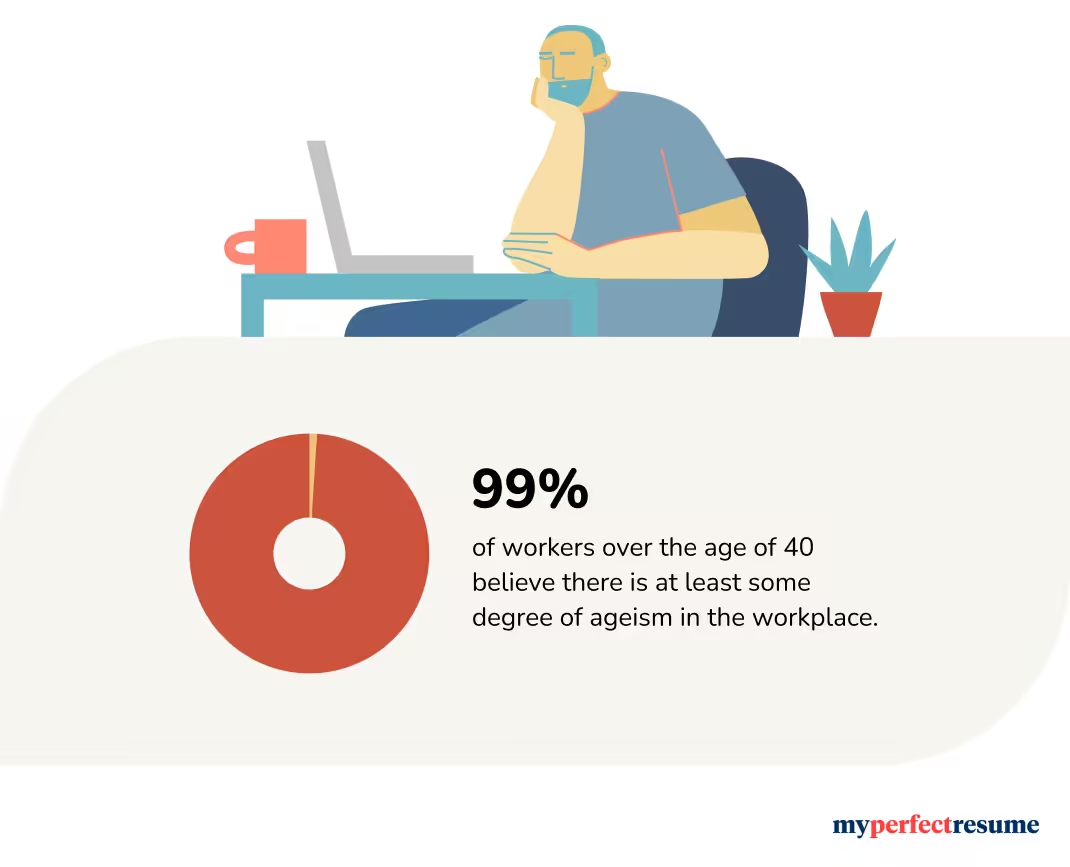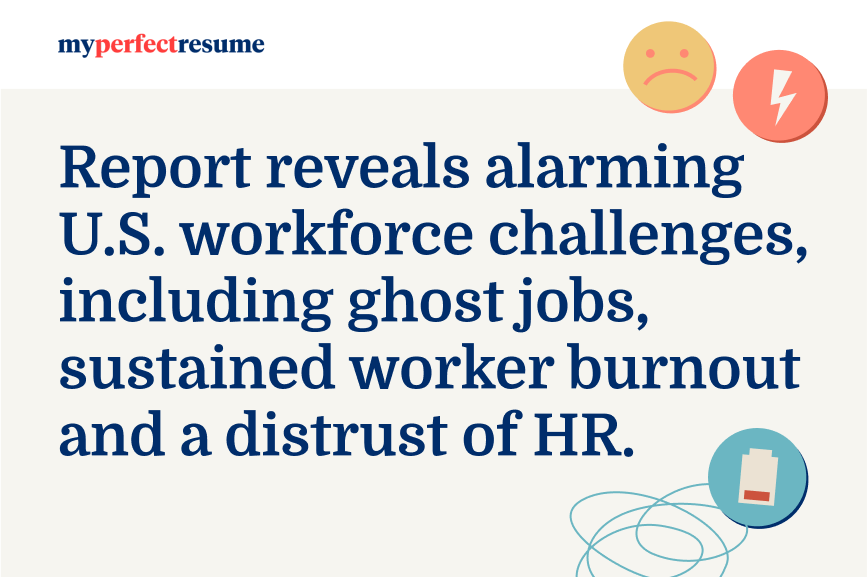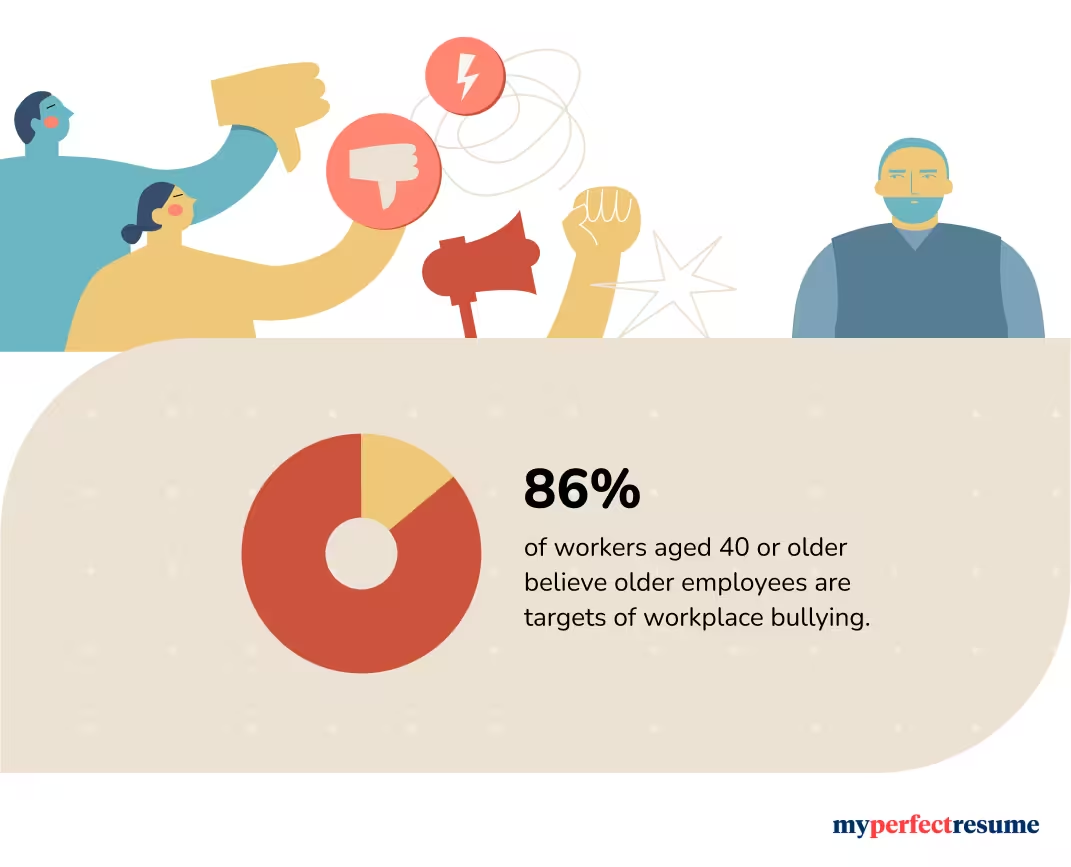Our customers have been hired at: *Foot Note
Age biases in the workplace remain a pervasive issue that can impact the confidence, behavior and sense of belonging among older employees. MyPerfectResume’s Generational Attitudes in the Workplace survey, which polled 1,003 American workers over the age of 40 on their feelings about ageism in the workplace.
Of those surveyed, 99% said they believe there is at least some degree of ageism in the workplace, and many reported encountering ageist stereotypes, bullying and subtle cultural pressures to conceal their age.
These findings underscore a workplace culture where experience and maturity are often undervalued, leaving many older employees feeling sidelined. The data identified some concerning trends for older workers, including:
- 92% say they have felt pressure to conceal their age or downplay their experience to avoid negative perceptions.
- 95% of respondents feel that age-related stereotypes have affected their sense of belonging or inclusion in the workplace.
- 86% believe that older employees are a target for workplace bullying.
- 88% of respondents admitted to sometimes adapting their behavior or language to fit in with younger colleagues.
- 81% say that age stereotypes are alive and well at work.
Age Discrimination Continues to Thrive
Of those surveyed, 99% say they believe there is at least some degree of ageism in the workplace, and 81% say that age stereotypes still exist there. Here’s how the data breaks down:

- 73% said that there definitely was ageism.
- 26% said yes, to some degree.
When asked whether they agreed with the statement, “Age stereotypes are still alive in the workplace,” most people agreed.
- 51% said that they somewhat agreed with the statement.
- 30% said that they strongly agreed with the statement.
The Pressure Is on to Seem Youthful
When asked whether they have ever felt pressure to conceal their age or downplay their experience to avoid negative perceptions, 92% of those surveyed said they did.
Most workers aged 40 and older admit to adjusting how they act and speak at work to avoid standing out. When asked how often they adapted their behavior or language to fit in with younger colleagues, 88% admitted that they do at least sometimes.
Only 2% of respondents said they never change how they act or speak around younger coworkers.
Here is a breakdown of the data:
- 69% said they sometimes change their behavior or language to fit in with younger colleagues.
- 19% said they often change their behavior or language to fit in with younger colleagues.
- 11% said they rarely change their behavior or language to fit in with younger colleagues.
- 2% said they never change their behavior or language to fit in with younger colleagues.
- 26% of men report regularly changing how they act or speak around younger coworkers, compared to 12% of women.
Stereotypes Sting Older Workers
Ageism in the workplace impacts the psyches of older workers. Most respondents (95%) reported feeling age-related stereotypes have affected their sense of belonging or inclusion in the workplace. Further, the majority of older workers (86%) believe that they are targets for workplace bullying.
When asked how much they agreed or disagreed with the statement, “Older employees are a target for workplace bullying,” the majority of respondents agreed.
- 55% said that they somewhat agreed with the statement.
- 31% said that they strongly agreed with the statement.
- 11% said that they somewhat disagreed with the statement.
- 3% said that they strongly disagreed with the statement.
Key Takeaways
Ageism in the workplace significantly impacts older workers, with many feeling compelled to hide their age due to stereotypes and discriminatory behaviors. This erodes their confidence and sense of belonging. Organizations need to shift culturally to recognize age diversity as a strength, valuing the skills and experiences of older employees rather than marginalizing them.
For press inquiries, contact Elizabeth Buccianti at elizabeth.buccianti@bold.com.
Our customers have been hired at:*Foot Note






